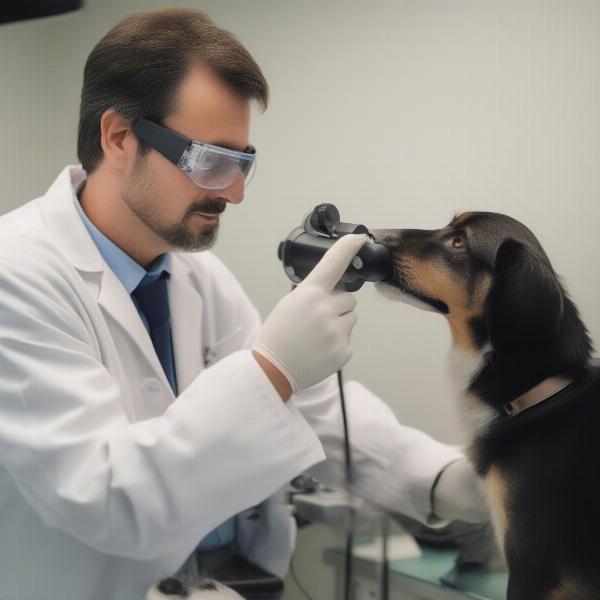Anterior lens luxation is a serious eye condition in dogs where the lens, the clear structure behind the pupil that helps focus light, dislocates and moves forward into the eye’s anterior chamber. This can cause a range of problems, from mild discomfort to severe pain and even blindness. Understanding this condition is crucial for any dog owner, especially for breeds predisposed to it.
What is Anterior Lens Luxation in Dogs?
Anterior lens luxation, often shortened to ALL, occurs when the tiny fibers holding the lens in place break down. The lens, normally positioned behind the iris, shifts forward and can obstruct the normal flow of fluid within the eye, leading to increased pressure and glaucoma. This condition requires immediate veterinary attention. The sooner it’s addressed, the better the chances of preserving your dog’s vision.
Recognizing the Signs of Anterior Lens Luxation
Early diagnosis is critical in managing anterior lens luxation. Be vigilant for these signs:
- Redness: The eye may appear red and inflamed.
- Cloudiness: The eye may look cloudy or hazy.
- Pawing at the eye: Your dog may rub or paw at their affected eye due to pain or discomfort.
- Watering eyes: Excessive tearing can be a sign of irritation.
- Squinting: Squinting or blinking more than usual indicates eye discomfort.
- Dilated pupils: Dilated or uneven pupils are a common symptom.
- Vision changes: You may notice changes in your dog’s ability to see or navigate.
If you notice any of these signs, contact your veterinarian immediately.
Causes and Risk Factors
While trauma can sometimes cause anterior lens luxation, it’s often linked to genetic predisposition. Certain breeds, such as Terriers, Miniature Poodles, and Chinese Cresteds, are more susceptible. anterior lens luxation dog Understanding breed-specific risks is vital when choosing a dog. Regular eye checks with your veterinarian, especially for at-risk breeds, are crucial for early detection.
Treatment Options for ALL
Treatment options vary depending on the severity of the luxation. Medication can manage secondary glaucoma, while surgery may be necessary to remove the displaced lens. eye removal surgery dog Your veterinarian will determine the best course of action based on your dog’s individual needs.
Living with a Dog with Anterior Lens Luxation
If your dog has been diagnosed with ALL, regular veterinary checkups are essential. Pain management and monitoring for glaucoma are crucial components of long-term care.
 Veterinarian examining a dog's eye for anterior lens luxation.
Veterinarian examining a dog's eye for anterior lens luxation.
Conclusion
Anterior lens luxation is a serious eye condition that can significantly impact a dog’s quality of life. Early diagnosis and prompt veterinary intervention are essential for managing this condition and potentially preserving vision. Be aware of the signs, understand the risk factors, and maintain regular eye checks for your canine companion.
FAQ
-
What causes anterior lens luxation in dogs? While trauma can cause ALL, it is often due to a genetic predisposition, especially in certain breeds.
-
Is anterior lens luxation painful for dogs? Yes, ALL can be very painful and cause significant discomfort.
-
Can anterior lens luxation be cured? While medication can manage symptoms, surgery is often the most effective treatment option for removing the displaced lens.
-
What breeds are most at risk for anterior lens luxation? Terriers, Miniature Poodles, and Chinese Cresteds are among the breeds most predisposed to ALL.
-
What should I do if I suspect my dog has anterior lens luxation? Contact your veterinarian immediately for an examination.
-
Can a dog live a normal life after lens removal surgery? Many dogs adapt well to life with one eye or reduced vision after surgery.
-
How can I prevent anterior lens luxation in my dog? While you can’t prevent genetically predisposed ALL, regular veterinary eye exams are crucial for early detection.
ILM Dog is your trusted resource for expert dog care advice. We offer a wealth of information on dog breeds, health, training, nutrition, grooming, and much more. From puppy care to senior dog needs, we’re here to support you every step of the way. Whether you’re a seasoned dog owner or just starting your journey, ILM Dog provides the resources you need to ensure your canine companion’s well-being. Contact us today for personalized advice: Email: [email protected], Phone: +44 20-3965-8624. Let ILM Dog be your partner in providing the best possible care for your furry friend.